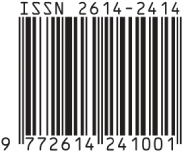Adaptation of a Sexual Violence Measuring Tool to Classify the Risk of Convicts Who Perpetrate Sexual Violence
Adaptasi Alat Ukur Kekerasan Seksual untuk Mengklasifikasikan Resiko Narapidana Pelaku Kekerasan Seksual
Abstract
This study aims to develop a risk assessment tool for sexual violence recidivism in incarcerated individuals in Indonesia, considering both static and dynamic factors. Data analysis showed a strong positive correlation between recidivism and "Prior Sexual Offenses" (0.554) and the total static factor score (0.251). The frequency of sexual violence also moderately correlated with recidivism (0.232). Certain static factors had better predictive capabilities for identifying recidivism, while others showed lower predictive power. Regarding dynamic factors, the study found strong positive correlations with deviant sexual lifestyle (0.741) and sexual compulsivity (0.676), and weaker correlations with Interpersonal Aggression (0.505) and attitude towards criminal behavior (0.286). The total static and dynamic factor scores had a significantly positive and strong correlation (0.872), highlighting their importance in predicting recidivism. The AUC analysis indicated good predictive capabilities for recidivism in certain dynamic factors like interpersonal aggression and emotional self-control, while others had lower predictive abilities. Overall, the combined total score of static and dynamic factors yielded higher predictive capabilities (AUC=0.783). This research contributes to the development of an accurate risk assessment tool for sexual violence recidivism, aiding in identifying high-risk offenders and designing effective rehabilitation programs to prevent future recidivism.
Copyright (c) 2023 MARKUS MARSELINUS SOGE

This work is licensed under a Creative Commons Attribution-NonCommercial 4.0 International License.













